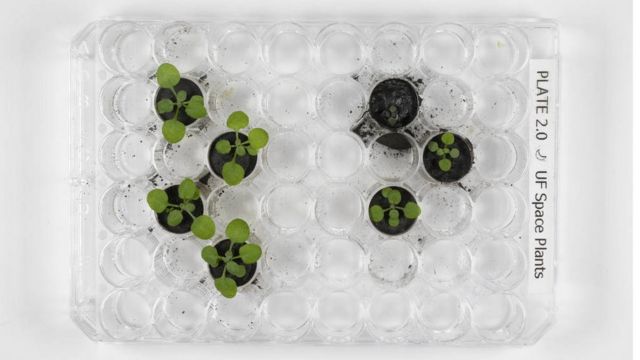The BBC News Russian Service app is available for IOS and Android . You can also subscribe to our Telegram channel.

image copyrightUF/IFAS
Scientists were very happy that the seeds were able to germinate in the lunar soil
Scientists have grown greens in lunar soil for the first time. A successful experiment is an important step towards making a long-term stay on the Moon possible for humans and in the distant future to solve the problem of food shortage on Earth.
The researchers took samples of dust collected during the Apollo missions from 1969-1972 and planted watercress seeds in it.
Much to their surprise, the seeds germinated in two days.
image copyrightUF/IFAS
Scientists were given just one gram of soil per plant
“I can’t tell you how amazed we were,” said Anna-Lisa Paul, a professor at the University of Florida and co-author of the study.
The plants in the lunar sample and normal soil looked the same until about the sixth day. After that there were differences. Plants in the lunar soil began to experience stress, develop more slowly, and eventually lag behind their Earth counterparts in growth.
But scientists say that this is still a breakthrough that has applied significance.
“This research is critical to NASA’s long-term goals as we will need to use the resources found on the Moon and Mars to develop food sources for future astronauts who will live and work in deep space,” said NASA chief Bill Nelson.
That seeds grow more slowly in lunar soil is an important finding, not just for space exploration, Nelson says.
“NASA is working to implement agricultural innovations that can help us understand how plants cope with stressful conditions in food-deficient areas here on Earth,” explains the head of NASA.
One problem for researchers is that the amount of lunar soil on Earth is extremely limited. Over a three-year period starting in 1969, NASA astronauts brought back from the lunar surface 382 kg of lunar rocks, pebbles, sand, dust, as well as cores – soil samples obtained by drilling.
A team of scientists from the University of Florida obtained just 1 gram of soil per plant for the experiment, from samples that had been kept under lock and key for decades.
NASA is planning a manned mission to the Moon in 2025. If all goes well, it will be the first landing of a man on the moon since 1972.





